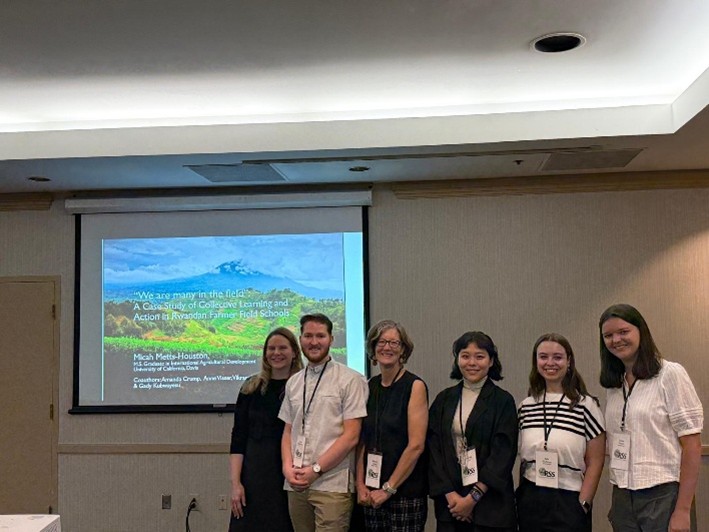
Micah Metts-Houston Presents at Rural Sociology Society (RSS) Annual Meeting
Shortly after graduating with my Masters in IAD this past June, I attended the Rural Sociology Society (RSS) annual meeting in Salt Lake City, Utah. This was a great opportunity to hear about old and new sociological perspectives, network, and present my own master’s research on Rwandan farmer field schools. I also had the privilege of accompanying my advisor, Professor Amanda Crump, thesis committee member Professor Ann Visser, and fellow IAD colleague and lab member Soo-Young Choi, who had just completed her own summer fieldwork in Uganda.

The meeting kicked off on an exceptionally warm July evening with an address by RSS President Kenneth Robinson from Clemson University, followed by a reception with fellow rural sociologists and researchers from other land-grant universities across the United States. The events that followed included typical conference features: keynote speakers, plenaries, posters, and oral presentations. However, I noticed a key difference from many other conferences I’ve attended: the feeling that I was truly where I belong academically. In terms of my research interests, I often feel like an outsider: thinking about social issues in agriculture while among plant scientists, focusing on rural rather than urban populations, and working with international research partners. As an interdisciplinary researcher, I often find myself overexplaining my professional and academic backgrounds as if they need some sort of justification.
At RSS, I no longer felt like I had two feet in different worlds. All these topics were open for discussion, and often in the same conversation. The agenda was packed full of fascinating sessions to the point where I had trouble deciding which ones to attend. I sat in on presentations ranging from the lasting impacts of Black Agrarianism in the southern US, to farmworker housing issues in Pennsylvania, to the development of agroecological hubs by the Small Farmer Movement in Brazil. The tone of this year’s conference was very much shaped by the unfolding political situation in the US, including conversations about the negative impacts to rural development and the wholesale slashing of foreign aid. There were also more uplifting discussions about how to better conduct sociological research in the present moment, integrating theories of justice into our work, conducting community-engaged research, and adopting indigenous knowledge and perspectives.
Attending RSS was a great way to cap off my time in IAD, giving me a chance to reflect on where I started and how I’ve grown throughout the program. One highlight was having a close professor from my undergraduate alma mater, Penn State, attend my presentation and provide helpful feedback. It truly felt like a full-circle moment to have former and current mentors who have played such a big role in my personal journey in the same room together.